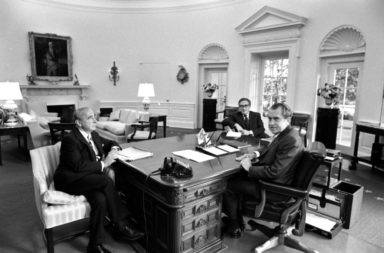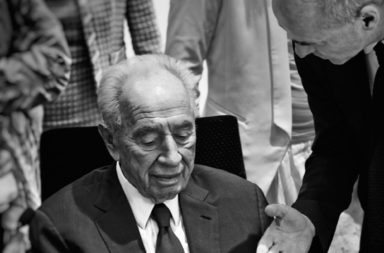In their interesting and comprehensive book The Forty Years War: The Rise and the Fall of the Neocons, from Nixon to Obama, the authors Len Colodny and Tom Shachtman provide substantial coverage of Fritz Kraemer’s political activities in the inner circles of Washington D.C. Roger Morris writes in the preface: “At the heart of the drama stands arguably the most important unknown figure in recent American history, the redoubtable Fritz G. A. Kraemer … a bureaucratic-political as well as ideological godfather of the neocons.”
Above you can see Dr Fritz Kraemer (left) in a briefing with US president Richard Nixon and Kraemer’s master student Dr Henry Kissinger in the Oval Office in 1973.
Read here more about his visions.
How he discovered young Henry Kissinger in 1944.
Fritz Kraemer on his mantra of “provocative weakness”.
The book “The Forty Years War” starts with a quotation from the retirement speech of Secretary of Defense Donald Rumsfeld on December 15th 2006, when he said: “It should be clear that not only is weakness provocative, but (that) the perception of weakness on our part can be provocative as well. A conclusion by our enemies that the United States lacks the will or the resolve to carry out missions that demand sacrifice and demand patience is every bit as dangerous as an imbalance of conventional military power.” The authors link this farewell statement to Fritz Kraemer who “coined the term provocative weakness” and made him the “unacknowledged godfather of the George W. Bush administration’s ways of relating the United States to the rest of the world”. The book goes on to describe the “influence and longevity of ideas that Kraemer disseminated in tutorials of Rumsfeld, Kissinger, Haig, Wolfowitz, Perle, and many others from the 1940s until his death in 2003” with his “militaristic tenets on the ideologues’ side of the U.S. Foreign Policy in a forty years long war against a pragmatist side”. Are these assertions correct and can Fritz Kraemer be characterized as the mentor of the neocons?
Donald Rumsfeld wrote an acknowledgement for the first limited edition of this book Fritz Kraemer On Excellence, published in 2004. Both of them knew each other well from Donald Rumsfeld’s fi rst tenure from 1975 to 1977 as the then youngest Secretary of Defense under President Gerald Ford. Fritz Kraemer at that time held the position of the Pentagon’s Special Advisor to the U.S. Army. Rumsfeld praised the ‘True Keeper of the Holy Flame in the Pentagon’: “What a special person Fritz Kraemer was. His courageous and brilliant career was an example for us all. I had the highest respect for him and valued my relationship with him greatly. I feel fortunate I was able to benefit from his insights.” In 2002, I picked up Fritz Kraemer at his home in Fessenden Street to attend the inauguration at the Pentagon of my friend Joseph Schmitz as the new Inspector General of the U.S. Department of Defense, a successor of the legendary German-born Friedrich Wilhelm Baron von Steuben, the fi rst Inspector General of the United States under George Washington. Henning-Hubertus Baron von Steuben, now head of the Steuben family clan and a long-time friend from my hometown Goslar in North Germany, joined the ceremony. Returning to his former sphere of activities for the first time in many years, I was surprised that hardly any member of the general staff had sought the advice of Old Fritz in recent years. The new generation of generals did not know him, and, due to their daily briefing stress, there was hardly any room left for extended geostrategic deliberations. In the fine floor of the Secretary of Defense he met Rumsfeld again after so many years. Energetically clinging to and raising his silver-handled walking stick with his left hand, Fritz Kraemer admonished him: “No provocative weakness please, Mr. Secretary!” I was able to take a photo of this encounter—one of the last of the great strategist.
During the Munich Security Conference in February 2005, I presented the Secretary of Defense my new book on Fritz Kraemer with his acknowledgement and the joint photo, as well as that last exhortation of the Pentagon guru.
In general Fritz Kraemer was pleased by the foreign and defense policies of Rumsfeld, Vice President Cheney, and the two Bush Administrations. But when I asked him: “Are you a neocon?” his short and brief answer was a simple “No”. This came as a profound surprise to me, given the fact that several neocons referred extensively to Fritz Kraemer and his dogma of the need for power, many of them cherishing him as the deepest individual inspiration of their life-time.
So, why didn’t Kraemer consider himself a “neocon”?
His friend Ed Rowny pointed out that Kraemer had always rejected labels and titles. When he was supposed to be given the title of a ‘Senior Advisor’, he simply remarked that “Dr Kraemer” would be sufficient.
He was certainly no “neocon”, but rather an “oldcon”: he had preached and lived the traditional Prussian ideals since the beginning of the 20th century, for nine decades. Therefore the label of a ‘new’ conservative must have looked absurd to him.
Kraemer avoided being pressed into a specific school of thought with others; instead he remained committed steadfastly to his own ideas and ideals. As far as they were congruent with other views, he welcomed it. He always remained a personality in his own right as well as a loner, who refused to be subsumed by any group. On the contrary, he considered it important that others understood and adopted his principles, following him as the Pentagon’s missionary and not vice versa.
There were commonalities with the American neocons, but several differences too with regard to analysis and strategic thought. Most of the actors in this group knew and respected him. He appreciated their commitment to a strong America in an unsafe world as well as their focus on sufficient means of military power and their employment wherever necessary. Honor, patriotism, and faithfulness as well as a firm belief in God were the convictions Kraemer appreciated. Moreover, their active engagement for democracy and human rights worldwide corresponded with his view that the Forces of Evil had to be restrained by the Good and that this task required adequate means of power as well as the resolve to employ them. He regarded both Saddam Hussein and Iran as great dangers which were granted too much leeway.
However, he never uttered typical slogans like “The Axis of Evil” or “War on Terror”. As a true intellectual behind the scenes he was not party to the simplifications that politicians must make. He was much more sophisticated in the old European way of thinking, because he had learned to view and analyze every country diligently and thoughtfully from a historical, cultural, and psychological perspective taking into consideration its regional roots. Consequently his analyses were comprehensive, deeply rooted in history and the psychology of the different people he avoided simplistic arguments. That distinguished him from any America-centric world view, responsible too often for inadequate implementation as well as lacking intuition for the local needs of foreign people, tribes, and other religions.
A show of modesty combined with moral and political leadership and sufficient power is needed when you are the Number One in a diverse world. The Washington super-power perception of the world became an offside trap. It lost its moral leadership. “Well-intentioned” can thus become the opposite to “well done” and too much pride can come before a fall.
Kraemer lived in his own profound and historically rooted world of ideas, in which the psychology of human beings and different people played a substantial role. His insights resemble a very large circle sharing significant common ground with the neocons’ thinking, particularly concerning the necessity of power, but also reaching far beyond.
For most contemporaries, his concept of avoiding “provocative weakness” took center stage.
His pupil Henry Kissinger even called him “right wing” in a conversation with U.S. President Nixon in 1972. But I consider this perspective much too narrow. Kraemer was more than just a promoter of sufficient defense capabilities. Unlike most others, personal ambition and material self-interest never interfered with his active engagement for freedom, democracy, and human rights. The policy he favored was ultimately peace policy without a spark of naivety. This included pressing for a soul in politics as well as connecting with the desires and fears of individuals. He was aware that a better society can not be erected in countries in which the new partners squander their moral credibility through corruption and the West places its hopes in a fake elite which seeks to enlarge its wealth rather than act responsibly. These other dimensions in Kraemer’s thinking and the resultant warnings were not taken seriously enough when the U.S. started to deploy abroad with the military in unknown territories with all the ego of a super power when more modesty and musicality was needed.
Personally I consider the term “neocons” inappropriate because it lacks precision. There are liberals committed to strong defense and freedom as well as U.S. Democrats with similar views such as Senators Henry M. ‘Scoop’ Jackson or Sam Nunn and the now independent Joseph Lieberman—does this make them “neocons”?
The term reveals a contradiction, because being conservative is nothing new and cannot be by definition. Moreover, the personalities labelled as “neocons” differ strongly and don’t adhere to a unified ideology; instead they follow their own plans.
Fritz Kraemer had no illusions about the bureaucratic process in Washington—whoever was in power—and about the lack of political deliberation and analysis in the Pentagon or the White House, even during the rule of neocon ideas. The Achilles’ heel of insufficient intellectual penetration and wisdom all different aspects of defense and foreign policy disquieted him, whether it was pre-9/11 or in the wars in Afghanistan or Iraq. What he missed was the required depth and consideration of all aspects from a historical perspective as well as that of those currently engaged or affected. Unfortunately Kraemer was right in this case as well. The lethal seed of the problems following the occupations of Afghanistan and Iraq lay in their superficial planning, after both military interventions had been concluded rapidly and successfully. Sloppy planning quickly turns good objectives into “lost victories” when an honorable policy is implemented by an incompetent, and perhaps even ignorant and arrogant bureaucracy. Naivety towards fanatics as well as complacency and lethargy—whichever party occupies the White House—pose the basic dilemma of bourgeois societies, according to Kraemer. This is a core problem of the foreign policy in the U.S. and other countries.
He considers honor a central value which must be preserved under all circumstances. That applies to the American armed forces as well as to local allies. Here is his red line for what an American soldier should never do and what he must do for his country and the cause of right.
Foreign policy—according to Kraemer —must have a soul not just instruments of power. It is soul that reaches human beings —the tribes in Afghanistan or in Iraq as well as the U.S. citizens; if it is missing all together it results in the failure of foreign policy.
“Shape reality—not only adopt it”; an active, forward-looking foreign policy is Kraemer’s credo. That implies not only the use of armed forces, but far more, encompassing all aspects of affected peoples’ lives.
Building up a new elite assuming responsibility in every country is of crucial importance—an aspect that has been subordinated and neglected in American foreign policy.
Provocative weakness describes perfectly the situation of American and Western weakness according to Kraemer. It originates mainly in the perception of insufficient military strength.
But it also occurs through unsteady and weak diplomacy, weakness of resolve, lack of deliberation, and the deficiency of high moral standards and the beacon of freedom which are attractive to all. Every time U.S. or Western policy lacks power, a soul, the will to shape reality instead of only adapting to it, or profound and detailed planning and a humane character, radicals feel encouraged to take advantage of this weakness.




